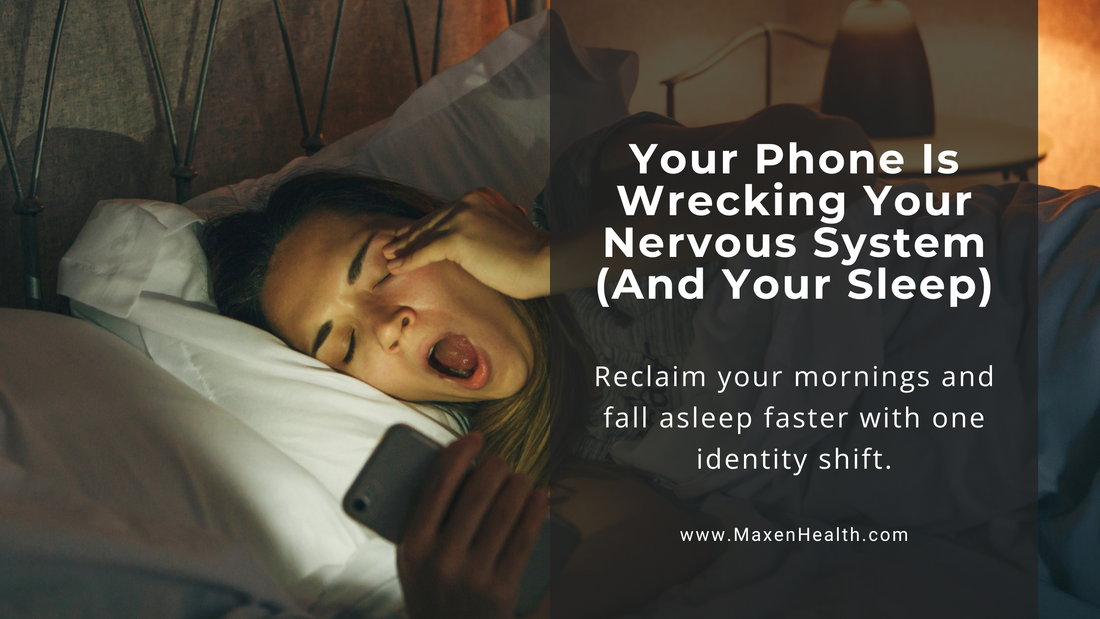
Your Phone Is Wrecking Your Nervous System (And Your Sleep)
Share
Reclaim your mornings and fall asleep faster with one identity shift.
You’re not wired and tired because you’re broken.
You’re wired and tired because you’ve been hijacked.
And your phone—the thing you rely on for everything from wake-ups to wind-downs—is the silent saboteur.
It’s not just a distraction.
It’s dysregulating your nervous system.
It’s flooding your brain with cortisol before you even leave your bed.
It’s stealing your ability to fall asleep when your body desperately wants to rest.
Let’s fix that without shame, and without becoming a digital monk.
The Problem: Scrolling = Stress
The average person taps, swipes, or clicks on their phone 2,617 times per day.
And most of that isn’t mindful. It’s reflexive. Addictive. Nervous system-triggering.
Here’s what your phone does to your body:
- In the morning: it spikes cortisol before sunlight hits your eyes
- During the day: it keeps your brain in fight-or-flight with endless inputs
-
At night: it blasts blue light and dopamine right when your system needs to calm
The result?
- Light sleep
- Racing thoughts
- Morning brain fog
- Midday crashes
- Evening anxiety
- A nervous system that never actually resets
You can take the best supplements in the world, but if your phone is wrecking your rhythm, the results will always feel flat.
The Insight: This Isn’t About the Phone—It’s About Your Identity
This isn’t a tech problem. It’s an identity problem.
Your nervous system can’t tell the difference between a missed email and a missed threat.
It reacts the same way: stress hormones, shallow breath, heart rate up.
When you grab your phone the second you wake up, you’re not just checking in.
You’re choosing to become reactive before you become intentional.
And when you scroll yourself to sleep, you’re telling your brain: “Stay alert. Stay stimulated. Stay unsafe.”
If you want better sleep, better energy, better focus - it starts by shifting one identity line:
“I am not someone who reaches for my phone first, or last.”
The Action Plan: Rewire Your Phone Behavior in 3 Simple Shifts
This isn’t about deleting Instagram.
It’s about creating rhythms that regulate your nervous system instead of hijacking it.
1. Anchor Your Mornings with Light, Not Likes
Before you reach for your phone:
- Step outside
- Get natural light in your eyes
- Breathe deeply for 2 minutes
- Drink water
- Say one affirmation aloud
Related post: "What High Performers Do Before 7 AM (That Most People Miss)"
Still reaching for stimulation in the morning?
Try JMPSTRT instead of dopamine scrolling. It fuels clarity and wakefulness without frying your brain.
2. Replace Scroll Time with a Wind-Down Identity
Instead of:
- Scrolling TikTok for 45 minutes
- Checking Slack “one more time”
- Watching autoplay videos until your brain feels numb
Try:
- Reading 3 pages of fiction
- Journaling 3 lines (not paragraphs)
- 90 seconds of breathwork
- Taking OVRNITE 30 minutes before bed to support natural sleep initiation
Create a new identity:
“I’m the kind of person who ends my day in rhythm, not noise.”
Coming Soon: "Don’t Start a Nighttime Routine. Start a Wind-Down Identity."
3. Use the “Phone Shelf Rule”
Set a physical rule:
Your phone lives on a shelf across the room, not in your bed.
- Buy an alarm clock
- Keep a book on your nightstand
- Move your charger
Out of reach = out of reflex.
The Encouragement: You’re Not Addicted - You’re Overstimulated
You’re not weak. You’re not broken.
You’re just living in a world that profits from your dysregulation.
But you don’t have to opt out of tech. You just have to opt into rhythm.
The more you choose calm over chaos, the more your body remembers what peace feels like.
And when your nervous system resets - your clarity, your energy, and your sleep all return.
